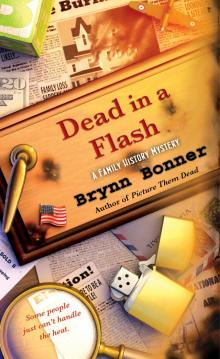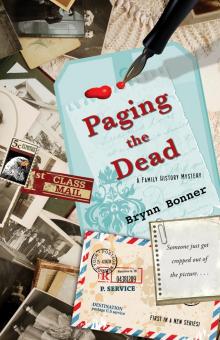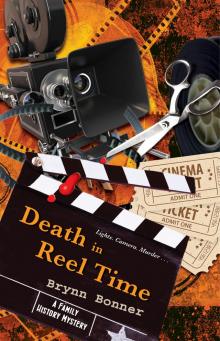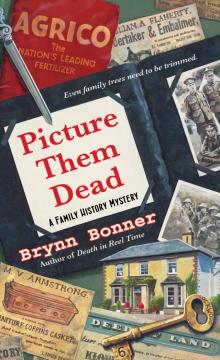- Home
- Brynn Bonner
Paging the Dead Page 4
Paging the Dead Read online
Page 4
Jack’s phone buzzed and I was irked when he dug it out of his pocket. Dissing people for a ringtone is a pet peeve of mine and he knows it.
“Sorry,” he said. “But I need to take this. It’s a text from my reporter friend, Julie. Let me see what she’s found out.”
I waited while he read the message from Julie. Of course she had to have one of those perky, girly names. I wondered if he ever called her “Jule” like he calls me “Soph.” I didn’t like Julie. I’d never met her, but I didn’t like the idea of her.
“That’s crazy,” Jack said, looking up at me. His eyes were wide and though they are a clear Carolina blue in the light of day, they shone like dark pools in the faint glow from the porch light.
“What is it?”
“She says the cops have got viable suspects in the murder of Dorothy Porter.”
“Well, great, that was quick,” I said. “Who? Who do they think did it?”
“They aren’t giving out names,” he said, still reading off the phone’s screen, “but the scuttlebutt around the station is that two women—investigators Mrs. Porter hired to dig up dirt on her family—were at the house earlier in the day. They’re the prime suspects.”
“That’s us! We weren’t hired to dig up dirt on her family, for pity sake, we were hired to trace her family roots. That’s crazy!”
“I know, that’s what I said.” Jack pushed his hands down in a settling motion.
Only then did I realize I’d been flailing my arms and yelling.
“It’s just a ridiculous rumor,” Jack said. “And even if there’s any truth to it you’ll get it all straightened out when you talk with the detectives again.”
“You’re right,” I said. “We’ll get it cleared up first thing tomorrow. We will.” I tried to force confidence into my voice, but my legs had turned to jelly.
six
I AWAKENED THE NEXT MORNING TO CLANKING AND BANGING noises coming from the kitchen and the mingled aromas of what Esme calls big breakfast. That’s when I got really worried. When things are going badly Esme cooks. She believes in deep-fried comfort food therapy. During these cooking episodes it’s as if she’s exorcizing demons. She slams the pots and pans around and wields wooden spoons like weapons. She doesn’t blend ingredients, she punishes them.
“Everything’s ready,” she said as I came into the kitchen. “Sit down.”
I did as I was told. I knew Esme would tell me what was on her mind when she was good and ready and there was no use asking ’til that time came.
I’d told her last night what Jack’s reporter friend had texted about us being suspects and she was surprisingly blasé about it. No hissy fit, no threats of bodily harm. She’d simply said, “Detective Carlson will be hearing from me first thing tomorrow morning. I will not have people talking this kind of nonsense.” Then she’d dismissed the whole thing with a flap of her hand and gone off to bed. But she must have mulled it over in the night and now she was ticked off big time.
She set a plate full of food in front of me that could’ve fed a small family—bacon, eggs, cheese grits, homemade biscuits, fresh fruit; and a totally unnecessary softball-sized blueberry muffin balanced on the side of the plate.
“Uh-oh, things must be worse than I thought.”
“Stop mumbling and eat,” Esme said. “Things always look better after a hearty breakfast.”
I took a sip of juice then searched for a spot to attack my plate. I wondered how much of our weekly food budget was on the table, which brought me back to the question that had occurred to me last night.
“Esme,” I said, “you know, now that Dorothy is gone—”
“Yeah, I’ve been wondering about that, too,” she cut in, picking at her food. “And no, you’re not a terrible person because you’re thinking about money at a time like this.”
“How do you do that?” I asked.
“Child, you are as transparent as Saran Wrap. And besides, I had the same thought last night and I felt guilty about it, too—but only for a second and a half.”
“I don’t know if we should even start the scrapbooks. I know how much Dorothy wanted them done, especially for Cassidy, and it would be a shame not to see the project through. But it’s a ton of work and if we’re not going to collect the rest of the fee maybe we should just return the stuff to somebody, I don’t even know who, and cut our losses.”
“But it seems disrespectful, doesn’t it? You know I didn’t have much love for the woman, but I do want her to rest peaceful.”
The doorbell rang and Esme looked over at the clock. “Who in the world comes calling at seven-thirty in the morning?”
We gave each other the once over. I was barefoot and wearing the yoga pants and threadbare Weezer T-shirt I’d slept in; Esme had her hair tied up and was in a nightgown, bed jacket and pink fluffy slippers. I was elected to go to the door.
My heart started beating fast as I went into the front hall. Could it be the police here to arrest us? Who else would be coming around at this hour? I told myself I was being absurd, but I wasn’t terribly persuasive.
I mounted the stepstool I have to use to see through the peephole and let out a puff of relief when I saw Ingrid Garrison standing there with Cassidy. Then relief gave over to confusion. Why would they be here?
“Well, you won’t know until you open the door and talk to them,” I muttered to myself, as I thumbed the lock and wrested the door open.
Ingrid had obviously had a very bad night. She was a younger, prettier and warmer version of Dorothy with wide-set blue eyes and a ready smile. Her blond hair was shot through with gray and worn in a pixie cut. She was trim and fit and exuded an earthiness that was appealing. But today her eyes were swollen and her whole body seemed to sag.
“Sophreena, I am so sorry to bother you at this hour of the morning, but Cassidy really wanted to speak with you and Esme.” She gave the child a quick glance and me a beseeching look. “I’m sure you’ve heard what’s happened with Dorothy,” she said, “I’ve got to meet Joe to make the arrangements in a few minutes and this is the only time I could bring her.”
Her euphemism lingered in my ear: not what had happened to Dorothy, but what had happened with her. Cassidy was clutching a small cloth bag to her chest, her little face a mask of misery and confusion.
“No, it’s fine,” I said, motioning them inside. “You caught us at breakfast. Want to join us? There’s plenty.”
“A cup of coffee would be a godsend,” Ingrid said, settling on the couch and covertly checking her watch.
“How about you, Cassidy? Would you like a glass of juice or a muffin?”
“No, thank you,” Cassidy said. “Is Miss Esme here? I need both of you.”
I fetched Esme and the coffee and Cassidy got right to her agenda.
“Could you and Miss Esme find out who hurt my Auntie Dot? She said you and Miss Esme were smart people. She said if you two couldn’t find something it could never be found. I heard her tell her friend Miss Vivian that.”
Ingrid cringed. Clearly she hadn’t known what Cassidy had on her mind. Now what? Did I placate the girl by making a false promise that we’d find Dorothy’s killer? Or did I tell her flat out that wasn’t our job? One thing that seemed unwise to lay on her was that we were suspects.
“Please,” Cassidy added, her lower lip trembling and tears splashing over onto her pale cheeks.
“Cassidy,” Esme said, leaning forward and touching the girl’s cheek, “your Aunt Dot was very kind to say that about us. And we do know how to find out things, but mostly things that are written down somewhere. This isn’t like that. But do you know who is really, really good at finding out about who does something bad to another person, like who hurt your Aunt Dot?”
“Who?” Cassidy asked, worrying the little cloth bag’s handles.
“Detectives,” Esme said. “Police detectives. I’m going to see the detective today and I’ll make sure he knows how important it is that they find the bad person who did t
his so no one else gets hurt.”
“But my daddy says they’re local yokels. He says they couldn’t find their heinies with both hands, except he didn’t say heinies, but I’m not supposed to say asses.” She whispered the last word, wiping the tears away with the flat of her palm.
I didn’t dare look at Esme, for fear I’d lose it.
Ingrid’s eyes widened and her mouth formed a perfect O. “Little pitchers, big ears,” she said. “Cassidy, Daddy didn’t mean that. He was just frustrated.”
“I tell you what,” Esme said. “Sophreena and I will try to help the police. How would that be?”
“Good,” Cassidy said with a nod. She rose as if to signal her business here was done, still clutching the bag.
“That’s a cute bag, Cassidy,” I said, for lack of anything else to say. “I like the heart design on it.”
“Thank you,” Cassidy said, on automatic manners. “I have all my special things in here,” she said, digging inside the bag. “Like my books, my special stuffed dog, and this box Auntie Dot gave me. I’m going to solve it.” She brought out a familiar wooden box.
“That’s the puzzle box we—” Esme started, then caught herself, “that belonged to your great-great-grandmother.”
Cassidy shrugged. “I guess. Auntie Dot gave it to me yesterday. I was supposed to leave it at her house and play with it there, but I wanted to bring it home so I put it in my bag. Auntie Dot said if I can solve the puzzle my dreams will come true.”
“Would you like a little hint?” I asked Cassidy.
“No!” Cassidy pulled the box to her chest. “That would be cheating. I have to do it myself or else it won’t work.”
“What are your dreams?” Esme asked.
Cassidy didn’t hesitate. “I want to be a doctor when I grow up. And I want to have a husband who likes me and maybe he’ll be my nurse. And I want four kids—two girls and two boys, and I want a dog and a cat, maybe two cats. And a horse. Oh, and a blue house, sort of a purplish blue.”
“Wow, you’ve given this some thought, haven’t you?” I said.
“She’s a planner,” Ingrid said. “Speaking of which, we’d better get going, I’m supposed to meet Joe in a few minutes to sort out the arrangements for Dorothy. Thank you so much, and again I’m sorry we came so early, and so unannounced.”
When we reached the front door, Ingrid said, “Cassidy, you can go on to the car, honey. I need to speak with Sophreena and Esme about some adult things.”
Cassidy made her way in slow steady steps to the car. No skipping today. She held on tight to the bag that held the key to all her dreams.
“I am so sorry I put you on the spot like that,” Ingrid said once the girl was out of earshot. “I had no idea why she was hell bent on talking to you. She was so torn up last night I didn’t know what to do and all she kept saying was she needed to talk to you two.”
“It’s okay. Really,” I said, then steeled myself for an awkward moment and plowed on. “Listen, I know this isn’t the right time to bring this up with everyone still in shock, but I think I have to ask. Esme and I were wondering if we should go ahead with the family history scrapbooks.”
“Well, I’m not sure,” Ingrid said. “Speaking for myself I’d still like them done for Cassidy, but I’m not sure it’s up to me. Honestly, I haven’t even thought about stuff like that yet. I guess you should talk with Joe about it. He and Dorothy were still legally married and he’ll be handling all her outstanding business.”
“Okay, I’ll ask him in a few days,” I said. “And I am so sorry about your sister.”
“I’m sorry, too,” Ingrid said, her eyes focusing on the lone cloud intruding on the Carolina blue sky. “I’m sorry about a whole lot of things when it comes to my sister.”
• • •
I had no appetite now for the remainder of my big breakfast. I couldn’t get Cassidy’s face out of my mind. For that child to love Dorothy with that kind of devotion she must have known a side of the woman Esme and I seldom saw.
Family means everything to me, maybe because I no longer have one. I had a great family. When I was young and brought home those little trophies from the Secret Santa shop at school that said WORLD’S BEST MOM or WORLD’S BEST DAD I really thought they’d made them just for my parents.
I was older than Cassidy when I lost my folks but I felt no less confused than Cassidy seemed about them being here one moment and gone the next. Gone where? I couldn’t get my mind around that, not then and not now. And Esme was no help. Her spirits have a strict don’t-call-us-we’ll-call-you policy.
Both my parents were only children so what few relatives I have left are distant, in both consanguinity and geography. I long for family and envy people from big garrulous families that hold noisy family reunions and squabble over a deceased loved one’s soup tureen or the Postage Stamp quilt Aunt Lulu made when she was a bride. Those things matter enough to fight over because they’re the artifacts that help us identify with our tribe—that let us know we belong.
“Best run up and get dressed,” Esme said as she came down the stairs from the mother-in-law suite that’s her part of the house. My dad had added the space when his mother’s health started to fail, intending to have her come live with us, but she hadn’t lived to occupy it. I’d offered it to Esme when she came here five years ago, just until she could find a place of her own. She’d been in no hurry to apartment hunt and had insisted on paying me rent. I quickly got used to having her here and now it seemed like the most natural arrangement in the world.
“Do we have somewhere we need to be?” I asked. Esme is always careful with her appearance, but she looked especially well put together today.
“No, but that Detective Carlson is coming over to talk with us and I want us looking like a couple of respectable professionals.”
“So you think he’s going to suspect us less if we’re well dressed?” I asked.
“Just go get ready,” she said, picking up a dishtowel and giving it a half-hearted snap in my direction.
I donned the black slacks and tailored blouse I usually wear to meet with clients instead of my work-at-home uniform of jeans and T-shirt. The issue of Dorothy’s scrapbooks was weighing on me. If we got the go-ahead with the original deadline, we’d be hard pressed to make it if we lost two or three working days. I debated calling Joe Porter later in the day but decided it really would be gauche to ask him right now.
As it turned out I could have saved myself the worry. While I was slipping on my sandals my cell phone rang. I was surprised to discover Joe Porter on the other end. He accepted my condolences, then asked if I would come over to his service station that afternoon to discuss some things.
I said I could, but it made me uneasy. Why couldn’t he just state his business on the phone? I had a sinking feeling our project was about to get the ax.
I didn’t have time to stew about it though. I’d just gotten my hair tamed into a ponytail when the doorbell rang. Had to be the detective. I couldn’t decide whether to be relieved or scared. Surely we’d get this all straightened out, but what if we didn’t?
Detective Carlson was alone this time and he and Esme were already settled into opposing armchairs when I came into the living room. The detective started to stand but I motioned for him to stay seated, amused that being a cop hadn’t strained the southern gentleman out of him. I sat on the middle cushion of the sofa in case I needed to referee and placed my time-stamped receipts from yesterday on the coffee table. I like to be prepared.
“Thank you for coming by, Detective Carlson,” Esme said. She was cordial, but I knew it was killing her to hold in what she was really feeling. “Sophreena and I are concerned that there seems to be a rumor going around that we are suspects in the death of Mrs. Porter. We would like these rumors nipped in the bud. We’d like to clear up any questions you have right now.”
The last two words came out a little harsh. I gave her a warning glance, but Carlson didn’t seem ruffled.
&
nbsp; “Where did you hear such a rumor?” he asked.
“That’s not important,” Esme said. “We just want it to stop.”
“Look, we aren’t in charge of the town’s rumor mill,” he said, spreading his hand, palm up. “And the truth is, you are suspects.”
I held my breath, expecting Esme to erupt, but she kept her cool—in fact she was downright frosty. “Pardon me?” she asked.
“Everyone who had contact with Dorothy Porter yesterday is a suspect,” Carlson said, “until they’re ruled out. Doesn’t mean I think you killed the woman, but it does mean we’re going to investigate. I wouldn’t be doing my job otherwise.”
“We understand that,” I said. “ That’s why we contacted you. Once we’re cleared you won’t have to waste any more time and energy on us and you can get on with finding the person who did it.” I picked up the receipts and handed them over. “These will prove our whereabouts yesterday afternoon and I’m sure there are store cameras if you can’t accept these.”
Carlson studied them for a moment, then took out his little notebook and scribbled in it. “Thanks,” he said, handing back the receipts. “Could you tell me where you were later in the afternoon?”
“Here,” Esme said. “We got here about six, or six-fifteen maybe. Our friends were here waiting for us. Oh, and we stopped for gas at the service station over on Carver Street before that. I’m sure they have cameras, too. Fact, I know they do. I was there when they were installing them a few months ago. Guy that runs the place told me he was having trouble with drive-offs since the price of gas got so high and he’d finally decided to pony up for cameras.”
“Unfortunately, Miss Sabatier,” Carlson said, lifting an eyebrow, “he put in dummy cams; as effective a deterrent as real cameras but at a fraction of the cost. Course, I probably shouldn’t let that cat out of the bag; let’s keep that just between us.” He gave her a smile, but she wasn’t having any of it.
She crossed her arms. Never a good sign.
“I’m sure we have the receipt somewhere,” I said quickly, “or that the clerk will remember. Her name’s Cindy, she knows me, I used to babysit her. She was looking out the window and I waved to her.”

 Dead in a Flash
Dead in a Flash Paging the Dead
Paging the Dead Death in Reel Time
Death in Reel Time Picture Them Dead
Picture Them Dead